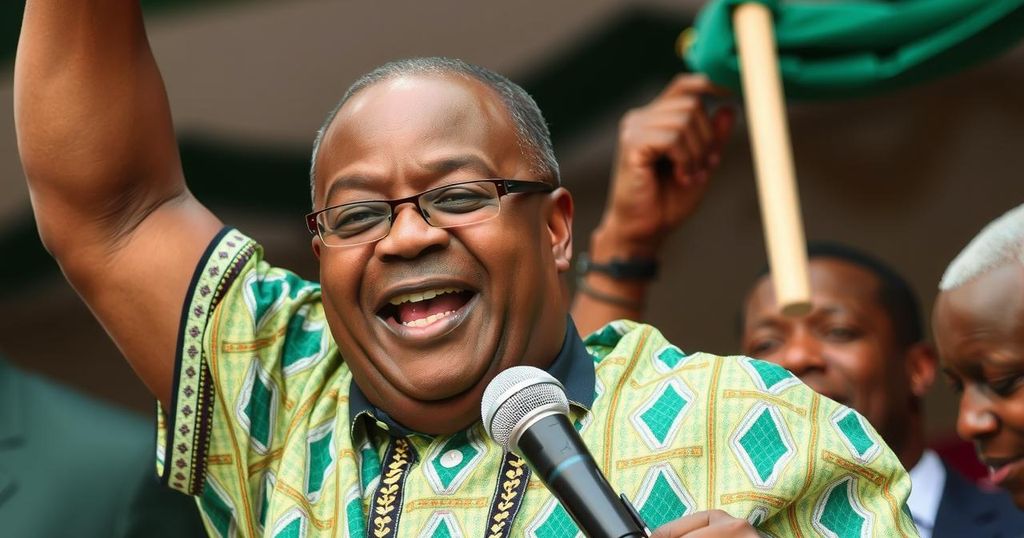John Drahami Mahama has returned to power in Ghana after winning a decisive electoral victory. His opponent, Vice President Mahamudu Bawumia, conceded defeat, acknowledging voter frustrations over economic hardships. Mahama’s win ends eight years of NPP rule amid widespread calls for economic reform. The election results are pending official confirmation from the electoral commission, but early indications show a significant lead for Mahama and the National Democratic Congress (NDC).
Former President John Drahami Mahama of Ghana has achieved a significant electoral victory, marking a remarkable return to power after voters expressed dissatisfaction with the ruling party’s handling of a national economic crisis. Following the election held on Saturday, Vice President Mahamudu Bawumia of the ruling New Patriotic Party (NPP) conceded defeat on Sunday, acknowledging the desire for change among Ghanaians amid growing frustrations over soaring living costs. This election marks an end to eight years of NPP governance under President Nana Akufo-Addo, whose administration faced severe economic challenges, including high inflation and a debt default.
Mahama previously served as president from 2012 to 2017 and embarked on his third campaign for the presidency after unsuccessful bids in 2016 and 2020. “Former president Mahama has won the presidential election decisively,” stated Bawumia during a press conference. The NDC’s victory in parliamentary elections was also confirmed by Bawumia’s remarks, indicating a clear mandate from the electorate.
Celebrations erupted in the streets of Accra as Mahama’s supporters proudly displayed the party’s colors and shared their excitement over their leader’s return. Although Mahama has not yet made a public statement, he later confirmed receiving a congratulatory call from Bawumia acknowledging his emphatic victory. The United States Embassy in Ghana commended the conduct of the elections, highlighting their alignment with the will of the Ghanaian people.
The economic landscape was a pivotal factor in this election, as Ghana, a leading gold producer and the world’s second-largest cocoa exporter, experienced significant financial stress culminating in a $3 billion International Monetary Fund bailout. Early reports from the NDC indicated that Mahama secured approximately 56.3 percent of the vote compared to 41.3 percent for Bawumia before official results are fully released by the electoral commission, which anticipates announcing final outcomes by Tuesday.
The political climate in Ghana since the re-establishment of multi-party democracy in 1992 has seen a consistent alternation of power between the NPP and the NDC. Mahama’s return may signal a reassessment of priorities as he takes on the challenges posed by the lingering economic difficulties, building upon his earlier experiences in office.
The context surrounding John Mahama’s victory is deeply rooted in Ghana’s recent economic history, which has been characterized by severe inflation, debt issues, and economic mismanagement. The ruling NPP, under President Nana Akufo-Addo, faced mounting criticism for its handling of economic crises, leading to widespread voter dissatisfaction. Economic conditions significantly shaped the electoral narrative, with Mahama’s previous presidency marked by notable economic challenges that further complicate his return. The political landscape in Ghana has remained competitive, with power alternating between the NPP and the NDC since the resurgence of multiparty politics.
In conclusion, John Mahama’s electoral victory reflects a clear demand for change among the Ghanaian populace in response to the ruling party’s economic failures. His return to power carries with it both expectations and challenges, as he must navigate ongoing economic difficulties. The endorsement from both the electorate and international observers sets a hopeful tone for future governance, suggesting a renewed focus on addressing pressing national issues that have previously troubled the country.
Original Source: www.wfxg.com







